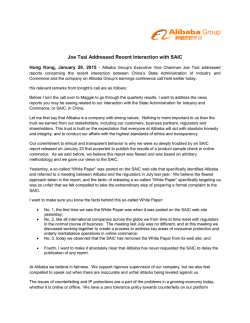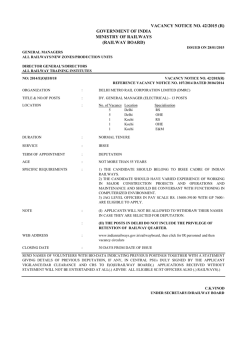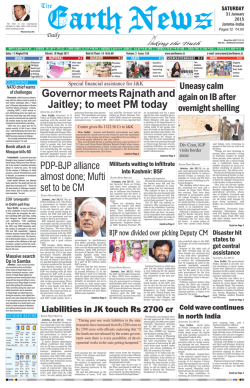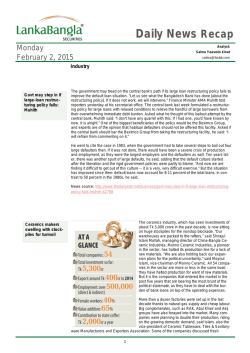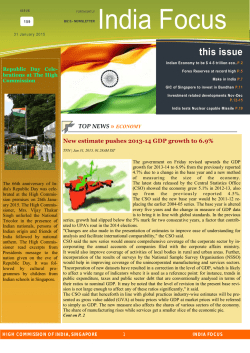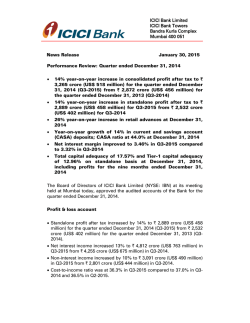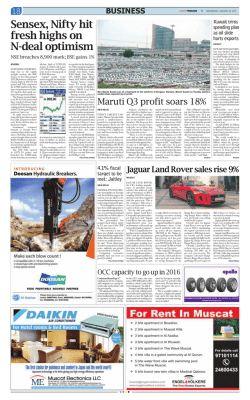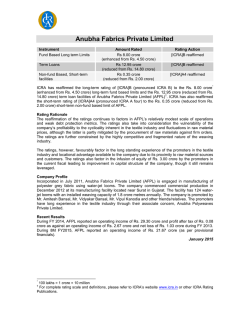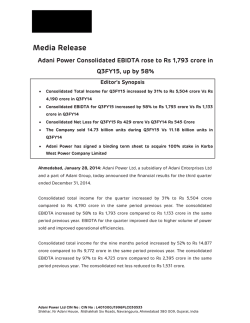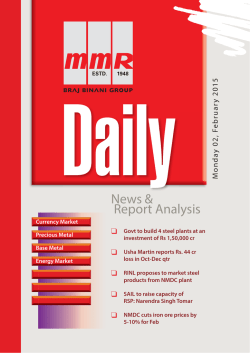
Prabhu pitches for greater investments in Railways
6 T HE ECHO OF INDIA SILIGURI Economy & Business Sunday February 1, 2015 Prabhu pitches for greater investments in Railways AHMEDABAD, JAN 31 /—/ Railway Minister Suresh Prabhu here on Saturday pitched for greater investments in railways and said development in the sector will help the country grow. The minister was here to flag off two new trains - AhmedabadChennai bi-weekly express and Ahmedabad-Darbhanga Jansadharan express. He also launched Wi-fi f acility at the city railway station. “It is a matter of pleasure for the country that our economy is on the path of improvement and progress. With this, responsibility of Railways has also increased. We need to work on many levels,” said Prabhu. He said that Railways’ financial health is not good and there is an urgent need of increased investments in the areas of modernisation, safety and security of passengers. “We have decided to increase investment in Railways... We have also decided to connect with various states for this (investment). Railways will fulfil the needs for Gujarat’s development as well. I will discuss with the Chief Minister on how to work on larger scale for improvement,” he said. Prabhu later met with Chief Minister Anandiben Patel. The minister also claimed that Railways was priority of the Prime Minister Narendra Modi-led government and the sector can contribute to his mantra of ‘Sabka Sath, Sabka Vikas’ (participation of all for development of all). “Development of Railways is on the priority list of our Prime Minister. If railways develop, economy will also be strengthened... and GDP (of the country) will also rise by 2-3 per cent. Though our GDP is growing today, with much efficient railways system it will grow rapidly,” he said. The minister said further development in the sector will also create jobs for youths. Prabhu appealed to people to join Modi’s flagship ‘Swachh Bharat Abhiyan’ and said the mission is associated with country’s identity. ‘Feasibility report on Bullet train being prepared’ AHMEDABAD: Prabhu also said the feasibility report on high-speed bullet train between Ahmedabad and Mumbai was being prepared with the assistance of a Japan government’s company. A feasibility report on the high-speed bullet train is being prepared with the governments of Maharashtra and Gujarat, Prabhu told reporters on the sidelines on flagging off of two new trains from Ahmedabad. “A company in the Japan government along with Indian Railway is assisting in that (making the feasibility report). There will be no budgetary provision (for the study) in the upcoming Railway budget as feasibility report will be finished after next budget,” he added. Prabhu also stressed on development of integrated transport system within cities to cope with rising number of migration from rural to urban cities. “Population in cities has been increasing. Considering this, we have to see that the transport system in cities are in an integrated manner. And now inte grated transport planning is a necessary thing for us, which will include inter-city transport facility and an internal system within the city,” Prabhu said. Citing example of Ahmedabad’s BRTS (Bus rapid transit system), he said, “If we will make an in- Sugar mills seek debt recast, export sops NEW DELHI, JAN 31 /—/ Reeling under debt of over Rs 36,000 crore, sugar industry on Friday demanded that the Centre should soon extend subsidy on exports of at least 2 million tonnes of raw sugar and restructure the borrowings in order to enable mills clear mounting arrears to cane farmers. Indian Sugar Mills Association (ISMA) infor med that all-India cane ar rears have already touched Rs 11,000 crore and expressed fear that the figure could cross last year’s peak of over Rs 13,000 crore if the corrective measures are not taken. The association also pointed out that the debt burden of the sugar industry has more than tripled to Rs 36,601 crore at the end of 2012-13 fiscal against Rs 11,443 crore in 2007-08. Seeking “desperate” financial help, ISMA President A Vellayan said: “We are passing through one of its worst financial crisis ever. Ex-mill sugar prices are at its lowest in the last three years. Our first plea is that government should immediately announce continuation of the incentive scheme on raw sug ar export for at least 2 million tonnes”. Vellayan said that even Pakistan has announced export incentives. He reminded that raw sugar could be produced only during the next two months. Stating that current ex-mill sugar prices have fallen by Rs 3 per kg in last four months and rates are Rs 5-7 per kg below production cost, ISMA said: “It is important to take corrective policy decisions”. The steps should be taken to ensure that “not only the prices stop from falling, but should recover the fall it suffered in last four months, as well as slowly improve to allow mills to cover their costs”, it said, adding that only then mills would be able to pay cane price of farmers and repay bank loans on time. On debt, ISMA said it “needs to be restructured, including moratorium of at least 3-5 years and reschedulement of repayment as well as reduction in interest burden of mills.” The restructuring of debt would help in ensuring that mills come out of the crisis. “This is probably the first time that the sugar mills are unable to even pay the FRP to most of the farmers. Several sugar mills are unable to repay their bank loans and some of them have either become sick or applied for restructuring of loans under CDR or have been declared NPA accounts,” ISMA said. Besides export subsidy and debt restructuring, ISMA sought that the Centre and the state governments should relook at the price fixation policy for sugarcane. It demanded that if states announce their own cane price, which is higher than the Centre’s Fair and Remunerative Price (FRP), then they should bear the difference. “Our industry is best suited for the direct benefit transfer. There should be one FRP. States should directly give benefits to farmers,” Vellayan said. (PTI) tegrated system (road and railways), they can be complimentary to each other. I will meet the Chief Minister and request to make an integrated transport plan,” he added. When asked about Ministry’s plan on port connectivity, Prabhu said, “There is an intense need to develop ports and they cannot be developed until and unless there is a rail connectivity. Therefore, we have decided to take necessary steps for connecting ports and if there is a need of private investment or if a state government will come for that, we will definitely support,” he said. To a query on Gujarat’s share in the upcoming budget, he said the ministry will decide after consultation with the state government. He said Railways has taken an initiative with the state government to work together where the state undertakes its priorities. (PTI) Alibaba faces possible US lawsuit after fake goods BEIJING, JAN 31 /—/ After a bitter row over sale of fake goods, the Chinese government and Alibaba Group warmed up even as the e-commerce giant faces a possible class-action lawsuit initiated by five US law firms. The legal action comes after the company witnessed the biggest drop in its stock price since its debut on the New York Stock Exchange in September. Pomerantz LLP, the Rosen Law Firm, Holzer & Holzer LLC, Howard G Smith and Bronstein, and Gewirtz & Grossman LLC of the US said on Friday they are investigating investor claims about Alibaba’s business practices, state-run China Daily reported on Saturday. This follows a critical Chinese government report about counterfeit goods being sold on the company’s online platfor m. The investigation, launched on behalf of Alibaba investors, is aimed at determining whether the company has engaged in inadequate disclosure and made false statements. It is the latest development in a conflict between the compan y, which is based in Zhejiang province, and the State Administration for Industry and Commerce (SAIC). Alibaba and the administration quarrelled this week over a quality-check report from the watchdog that found that less than 40 per cent of goods tested on Alibaba’s online platform Taobao were authentic. Taobao said it had received unfair treatment, while the administration said in a report, which has since been removed from its website, that the quality-check result had been withheld until recently. This was to avoid disrupting Alibaba’s ISP ‘lights up’ reheating furnace of Bar Mill EOI CORRESPONDENT BURNPUR/ KOLKATA, JAN 31 /—/ The Walking Beam Type Reheating Furnace of the Bar Mill of IISCO Steel Plant, Burnpur was lighted up by I C Sahu, Executive Director in Charge, on Friday for initial drying and heating of refractory mass followed by billet heating. Installed by a consortium of M/s Bricmont, USA and M/s MICCO, India, this fur nace has a heating capacity of 160t/hour and can produce 0.90 million tonnes per annum of finished products such as rebars in straight length of sizes 8 to 40mm. Commencement of hot trial of Bar Mill is expected within a period of two week soon after completion of initial heating of refractory mass. This milestone was achieved in the presence of ED(F&A) Sudhir Kumar, ED (Proj)I/c R N Das, ED(Works) R K Rathi, ED(Proj) A K Rath, and a large gathering of senior officials, engineers of consultant MECON and consortium members. “This is one more achievement in the Mill unit” said Sahu while lighting up the reheating furnace. Congratulating the employees engaged at Bar initial public offering in September, the world’s largest. In a statement issued on Friday, Alibaba said it will “vigorously defend the truth” and its reputation. The SAIC said on Friday just before the New York Stock Exchange opened that Zhang Mao, head of the administration, had met with Jack Ma, chairman of Alibaba, in Beijing. Zhang and Ma agreed to strengthen cooperation to crack down on fakes online and to work together for the healthy development of China’s inter net economy, the Daily report said. Hou Xiaotian, chief analyst at TH Capital LLC, a research and investment advisory firm, said nearly all big public companies are involved in class-action lawsuits from time to time. “It takes years to reach a verdict,” she said, adding that a lawsuit may not have a direct impact on Alibaba. Hou attributed the nearly 10 per cent drop in Alibaba’s stock price to the combined impact of the ongoing dispute with the regulator and the lower-than-expected earnings report released before the stock market opened on Thursday. This report showed Alibaba had revenue of USD 4.22 billion in the quarter ending December 31, but its year-on-year growth rate dropped to 40 per cent from 66 per cent a year earlier. “The unresolved dispute with the SAIC and the uncertainty over its business performance in the coming year led to heavy selling in premarket trading,” she said. (PTI) Sun-Ranbaxy deal: US FTC asks Ranbaxy to divest asset WASHINGTON, JAN 31 /—/ After Competition Commission of India, US fair trade watchdog FTC has asked Ranbaxy to divest one generic product as a condition for clearing its USD 4 billion deal with Sun Pharma to address monopoly concerns. The merger deal, once consummated, would create India’s largest and world’s fifth-biggest drug maker. To address monopoly concerns, the Federal Trade Commission (FTC) on Friday said Sun Pharmaceutical Industries and Ranbaxy Laboratories have agreed to divest the latter’s interests in generic minocycline tablets. Generic minocycline tablets are used to treat a wide array of bacterial infections, including pneumonia, acne, and urinary tract infections. The latest development comes more than a month after its Indian counterpart CCI directed both companies to divest seven products as it found that the deal could hit competition in the Indian market. According to FTC’s complaint, the proposed merger would likely harm future competition by reducing the number of suppliers in the US markets for three dosage strengths (50 mg, 75 mg, and 100 mg) of generic minocycline tablets. News In Brief Exide Q3 net up 25% Mill, Sahu said that since there is heavy demand for these products in infrastructural and construction sector, earliest production will help IISCO Steel Plant to augment its market share for these products. The Bar Mill has been installed under separate package by a consortium M/s Danieli & Company, Italy, M/s Danieli India and M/s Shriram EPC, India and is presently under cold trial operation. The hot trial of Bar Mill will be undertaken upon the readiness of the reheating furnace. Trade ties with China, EU to help leather industry CHENNAI, JAN 31 /—/ Trade agreements with China and European Union will help grow the domestic leather industry as a lot of opportunities exist in those countries for the Indian exporters, says the chairman of Council for Leather Exports. “One of our requests is to have trade agreement with China. China is a gold mine as a market,” M Rafeeque Ahmed, chairman, Council for Leather Exports, representing the leather industry, told reporters here. He further said, “People are afraid that China will dominate India, but my feeling is we can go and dominate their market in China. We want the government to have some trade agreements with China....” Ahmed also sought a similar agreement with European Union as it was one of the largest markets for the leather industry. Indian Trade Promotion Organisation Chairman J S Deepak said the government was looking at increasing leather exports to 25 per cent. “You know expor ts of leather have increased at an average of 15 per cent over the last five years. It is a very very huge increase. This is because exports have increased at a time when there is currency was witnessing a devaluation. We are looking at a vision of 25 per cent a year from the present 15 per cent,” Deepak said. Besides the EU, some markets in South America, South East Asia and parts of Commonwealth of Independent States (CIS) also offered huge opportunity for the industry, he said. Referring to increase in capacity for leather, Rafeeque Ahmed said the gover nment was expected to announce separate funding for the industry in order to incease the tanneries. “For the next three to five years we need investments of about Rs 300 to Rs 500 crore in Tamil Nadu. But countrywise, it is about Rs 1,500 crore. Such investments are needed to upscale the production,” he said. (PTI) NEW DELHI, JAN 31 /—/ Battery manufacturer Exide Industries Saturday reported a 25.42 per cent increase in its net profit at Rs 97.23 crore for the quarter ended December 31, 2014. The company had posted a net profit of Rs 77.52 crore in the same period last fiscal, it said in a BSE filing. Net sales during the period under review stood at Rs 1,557.9 crore as against Rs 1,301.41 crore in the year-ago period. Central Bank of India opens first forex hub VADODARA, JAN 31 /—/ The first forex hub of the Mumbai- headquartered Central Bank of India in Gujarat was opened at Urmi Char rasta here to provide prompt and efficient services to importers and exporters. Ramesh Singh, General Manager, Treasury & Inter national division, Central Bank of India inaugurated this forex hub here yesterday which is fully equipped with necessary infrastr ucture such as swift facility, f ax Internet etc besides trained staff. Speaking on the occasion, Singh said it is the first forex hub of the bank in Gujarat after opening of a forex hub in Mumbai in August 2014. Gold surges by Rs 250 NEW DELHI, JAN 31 /—/ After falling for two straight days, gold on Saturday staged a comeback to close Rs 250 higher at Rs 28,350 per ten grams at the bullion market as jewellers made fresh buying at prevailing levels to meet wedding season demand amidst a firming global trend. Silver followed suit and recovered by Rs 800 to Rs 38,350 per kg on increased offtake by industrial units and coin makers. Traders said besides wedding season buying by jewellers, a firm global trend amid the US economy expanding at a slower pace than forecast in the fourth quarter reignited demand for the precious metal as a safe haven. (PTI) Sensex, Nifty end in red after hitting all-time high MUMBAI, JAN 31 /—/ Heavy profit booking at the fag-end of the week pulled down the S&P BSE benchmark Sensex by 96 points to close at 29,182.95 and CNX Nifty by 27 points to end at 8,808.90 from their all-time high of 29,844.16 and 8,996.60 respectively. Trading for the week started on a strong note, but the trend reversed on the last trading session of the week when large caps declined sharpl y. Volatility was high as traders rolled WEEKLY-REVIEW over positions in the futures & options (F&O) segment from the January 2015 series to February 2015 series. The January 2015 derivatives contracts expired on Thursday. The S&P BSE Sensex fell by 95.89 points or 0.33 pct to 29,182.95. The index hit a record high of 29,844.16 in intraday trade during the week. The 50-unit CNX Nifty also fell by 26.70 points or 0.30 pct to 8,808.90 after hitting an all-time intraday high of 8,996.60. However, the S&P BSE Mid-Cap index rose 42.92 points or 0.40 pct to 10,738.59 while S&P BSE Small-Cap index fell 36.83 points or 0.32 pct to 11,329.26. The stock market was closed on Monday, 26 January 2015, for Republic Day. Index heavyweights led rally in key benchmark indices on the first trading session of the week on Tuesday. This was after India and the US on last Sunday reached an understanding on resolving the logjam in implementing the historic 2006 India-US nuclear deal and decided to take defence cooperation to a new level following a bilateral meeting between Indian Prime Minister Narendra Modi and US President Barack Obama. (PTI)
© Copyright 2026
